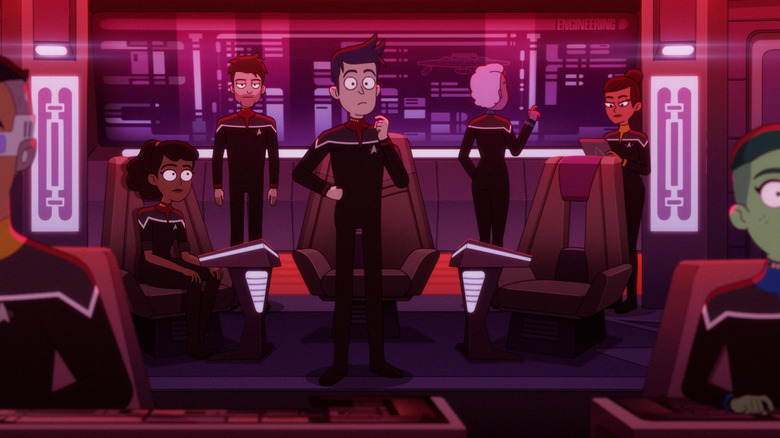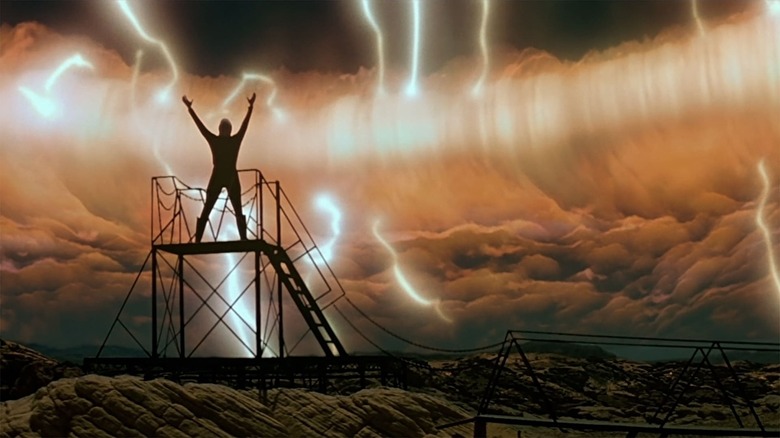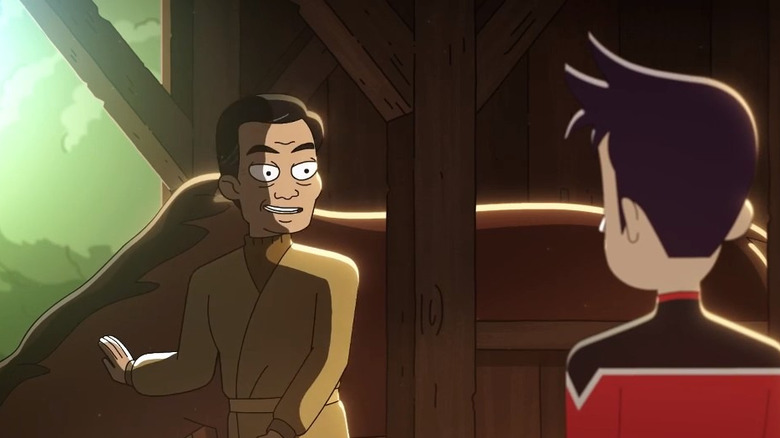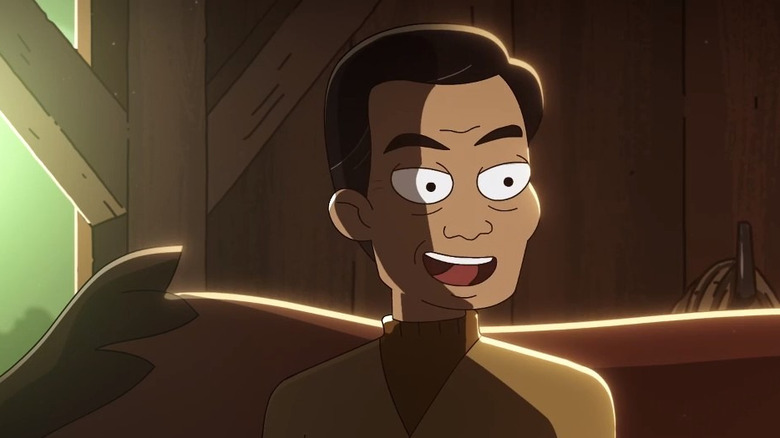Star Trek: Lower Decks Season 3's Big Cameo Is Also A Delightful Movie Reference
This post contains spoilers for the latest episode of "Star Trek: Lower Decks."
The eighth episode of "Star Trek: Lower Decks" is one of the show's "let's go hog wild" episodes. Called "Crisis Point 2: Paradoxus," the episode takes place entirely on the holodeck of the U.S.S. Cerritos with the show's four main characters exploring a rather complicated pre-programmed holographic adventure. It also serves as a sequel to the first season episode "Crisis Point" (October 1, 2020), which was also a holodeck-based adventure episode. In the original, Ensign Mariner (Tawny Newsome) took over a program made by Ensign Boimler (Jack Quaid) and transformed it into an adventure "movie," largely as an excuse to play-act the destruction of the ship and the deaths of her friends and family ... and her own holographic self. In so doing, Mariner learned that she had some deep-seated issues she needed to face. The holodeck proved to be a form of therapy for her.
True to that theme, "Crisis Point 2" begins with Boimler presenting his new "movie" as an adventure story from the start. His program is so complex that all the non-player characters can be interacted with and spin out into stories all their own. During the adventure, Boimler receives a communique and instantly becomes despondent. He and Mariner, much to her frustration, pursue an action-free "side-quest," wherein he seems to be looking for a certain kind of spiritual wisdom. Meanwhile, Ensigns Tendi (Noël Wells) and Rutherford (Eugene Cordero) play the adventure through, with Tendi taking the story very seriously, and Rutherford most certainly not. Tendi eventually learns that she has a drive toward command.
It's during this adventure that the makers of "Lower Decks" permit themselves to make every Trek reference they could think of, including the inclusion of George Takei.
The Nexus
Among the references in this week's "Lower Decks" are the bomb from "Star Trek: Nemesis," a god-like rock being like in "Star Trek V: The Final Frontier," an alien name hidden under dust like in "Star Trek: The Motion Picture," and what might be a dig at any number of "Star Trek" movies with a line about sequels ignoring the thing that made the series popular. This snob likes to think Ensign Mariner was referring to the Kelvin movies.
During the climax of "Crisis Point 2," Boimler finds God — a massive creature made of rock — and asks Him the purpose of life. When Boimler becomes frustrated with God's axiom-heavy answers, he kicks a hole in the side of God's head and climbs inside (!). While in there, the scene suddenly shifts and Boimler finds himself magically transported to the rustic farmhouse of Captain James T. Kirk.
This is, of course, a reference to David Carson's 1994 film "Star Trek: Generations." That film featured a free-floating spatial energy ribbon called the Nexus which orbited through the universe destroying ships, but absorbing their crew. Inside the Nexus was an ill-defined psychic realm that could read a guest's thoughts and provide for them whatever they most wished for. It was essentially Heaven. Also, because time has no meaning in the Nexus, both Kirk (William Shatner) and Picard (Patrick Stewart) could meet one another despite having been swept up 87 years apart.
When Picard enters Kirk's "Heaven," it's manifested as Kirk's own horse ranch where he, years before, spent days chopping wood, riding horses, and making breakfast for his offscreen girlfriend Antonia. Kirk's Heaven was something he already experienced. In Boimler's version of it, it's still the same ranch, but there is no Kirk. Instead, he meets Captain Sulu (Takei).
Captain Sulu
When Boimler asks why Sulu is there and not Kirk, Sulu explains that Kirk had to go time travel or something, and that he could never relax. Boimler asks if this is Heaven or the Nexus, Sulu merely says that it's Idaho and that the horses need feeding. Sulu finally gives a philosophical answer that Boimler finds satisfactory: that the randomness of death is a mere extension of the unexpected joys of life. When Boimler lightens up, he begins grilling Sulu about the Enterprise very much the way a real-life Trekkie would grill the real-life Takei about "Star Trek." Sulu flees the scene by having his horse bite Boimler (!).
This beatific climax is a mirror of "Generations," but also a continuation of a wonderful trend in Trek. The climax of a story isn't when a villain is bested or a battle is won, but when a character has a quiet, thoughtful moment of cathartic elevation. Boimler finds a small taste of meaning. In the comedic spirit of "Lower Decks," of course, that moment is undercut by a burst of whimsical bathos.
When Boimler awakens from his catharsis, he is in sickbay, having passed out from dehydration. He seems to have dreamed it. Or touched the Other Side; Dr. T'Ana (Gillian Vigman) points out that he was clinically dead. If it was the afterlife, Sulu would perhaps be there as the character likely died of old age long before the events of "Lower Decks."
Commander in Chief of Starfleet Command
One doesn't quite know what happened to Sulu after "Star Trek VI: The Undiscovered Country," where he was in command of the U.S.S. Excelsior.
If, however, one wants to look at expanded, non-canonical sources — which, as Trekkies, we all do — one might find that Sulu had a long and illustrious career as a command officer. In 1995, a company called Audioworks put out a trio of hour-long audio adventures about Captain Sulu, each one starring Takei. The episodes — "Envoy," "Transformations," and "Cacophony" — implied that Sulu's adventures were just as exciting as anything Kirk or Picard went through.
If one delves even further, one might discover the 2013 book "Federation: The First 150 Years" by David Goodman. The book was more or less a recap of many of the events of "Star Trek: Enterprise," mixed in with expanded letters and artifacts derived from extant Trek lore, and features some of the deepest cuts a Trekkie might find. It was meant to serve as a book that had escaped from within the "Star Trek" universe, presenting the future as old history. The book also came mounted on a plastic base with a button on it. When pressed, the button provided a brief, minute-long introductory narration by George Takei. According to the narration, it was 2311 and Hikaru Sulu was now an admiral and also Commander in Chief of Starfleet Command.
To put that in context, 2311 is about 18 years after "The Undiscovered Country." It's also when Sulu was about 74. By astonishing coincidence, that was about how old Takei was in 2013.



